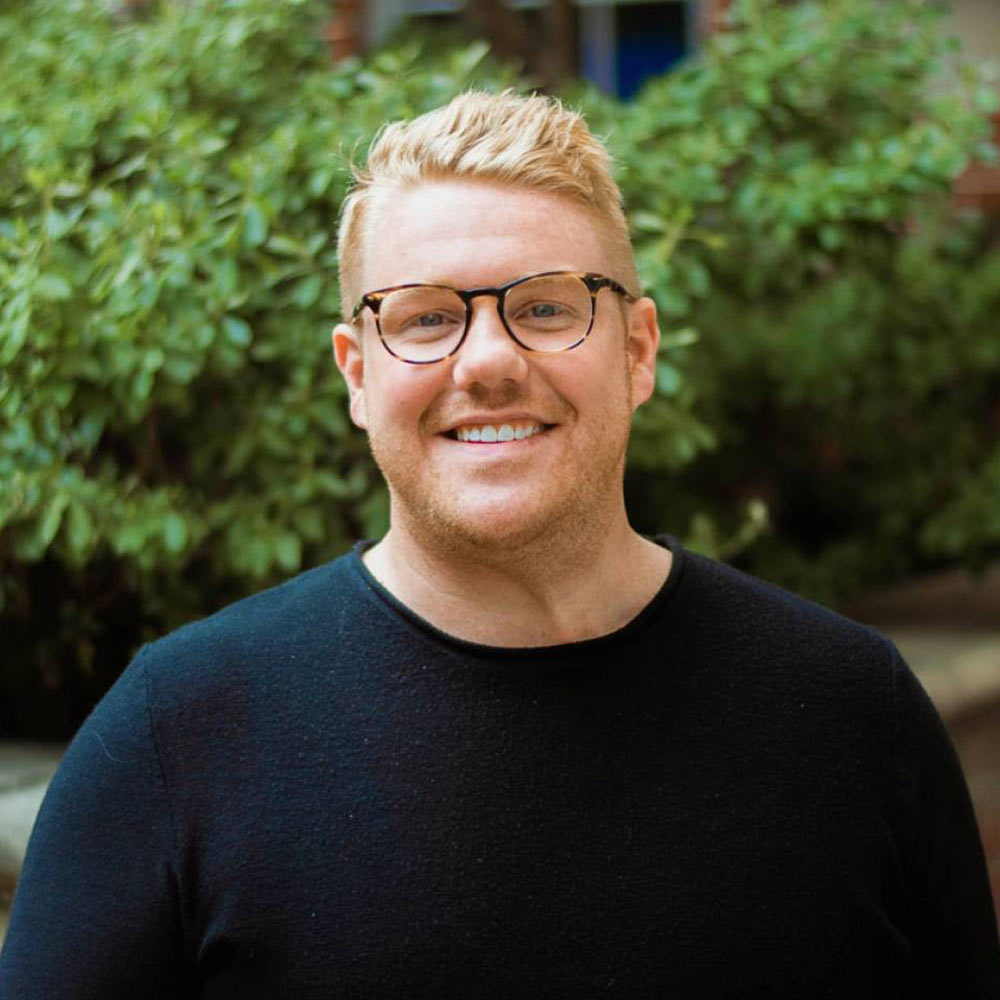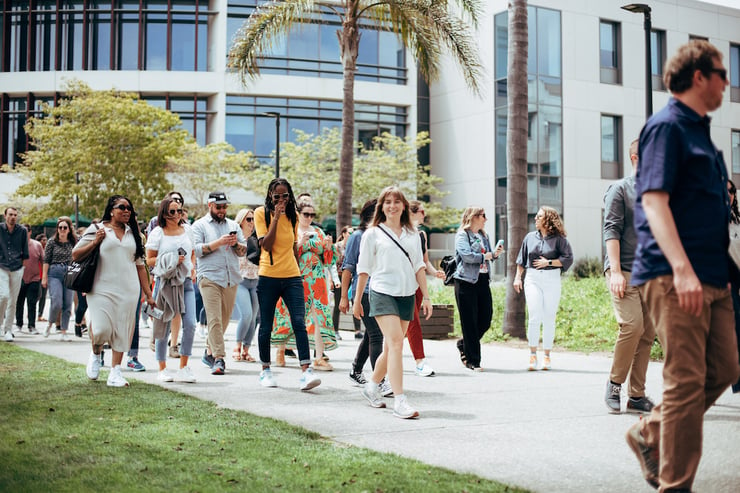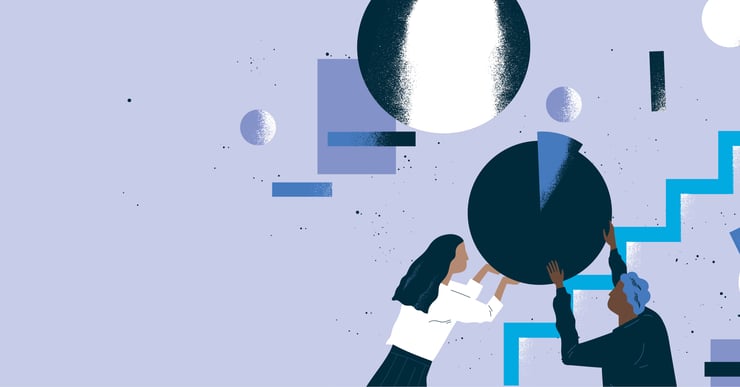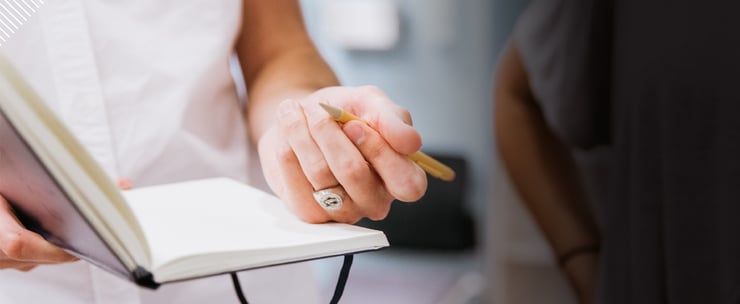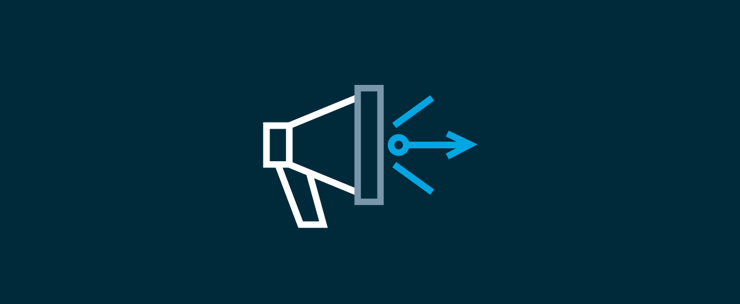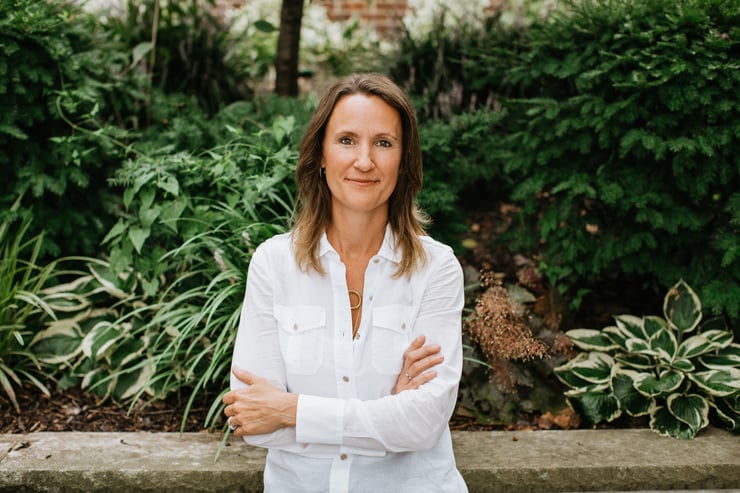SimpsonScarborough is exceptionally proud to announce the promotion of Meredith Simpson to Vice President of Research. Meredith was one of SimpsonScarborough's first hires back in 2006 after she graduated from the University of Richmond, where she earned a Bachelor of Science in Business Administration. I sat down with her to hear how she's grown as a researcher over the past 15 years, how SimpsonScarborough's evolved in that time, and what people can expect from the research team in the next year.
MK: Congrats on your promotion, Mere — it's well deserved. Being the VP of Research at a company known for the quality of its research is kind of a big deal.
Mere: Thank you! It's a title I've worked really hard for but feel really honored to have. Especially here.
MK: Let's start at the beginning. Give us some background as to how you became SimpsonScarborough's first employee.
Mere: Well, so when I started, I was about to graduate from Richmond, and I was literally Googling market research jobs because I had just taken a marketing research class, and we learned SPSS. I fell in love with it. I knew instantly that it was what I wanted to do.
I also knew that really learning SPSS would help me find a job. I was a senior at the time so finding a job was my main priority. Anyway, I'm specifically looking for jobs online that reference SPSS experience, and I found this listing for SimpsonScarborough and decided to apply. And it was funny because I guess they had just put up the job posting on their website and hadn't put it anywhere else. I don't even remember what the job title was — maybe Data Analyst or Research Analyst?
Anyway, I applied and heard back from Christopher Simpson. They didn't have an office space yet; it was just the original partners, so he invited me to his house for an interview.
So I text all my friends and let them know that I have this interview at this person's house, and if they don't hear from me in two hours, it's because I'm in someone's freezer in Ziploc bags.
MK: Did you seriously say that?
Mere: I really did. I had no idea who he was, and because it was such a new company, there was almost no information I could dig up about them. Their website was super simple, I think it'd only been around for a few months, and I had no idea who these people were.
MK: So, how'd it go?
Mere: The interview itself went great. But the funny thing is I didn't hear back from them… for like a long time. So I finally reached back out and followed up, and I get an email back from Elizabeth, who is obviously one of the original partners, and she says, "Oh, we thought we told you that you got the job!"
I ended up talking to Elizabeth on the phone for over an hour that day. At that point, I had already graduated and was home in Greenville SC, and I just instantly liked Elizabeth. I knew I would get along with her so well. I mean, it's Elizabeth — everyone loves her. And after that, I started planning my move up to DC.
MK: This is the summer of 2006, right? SimpsonScarborough had just been founded?
Mere: Yeah, and it's just the four original partners, including Christopher and Elizabeth, and then myself, and Teresa Valerio Parrot were the only two employees. I guess I should say that there is some debate about me being the first employee. Teresa was actually working with Christopher on the Crisis Comms side of the house, so she gets mad when I say that I'm the first employee (laughing) — it was technically her, but I still kind of claim it for myself.
MK: So, what were the early years like?
Mere: It was incredibly busy but so much fun. I was programming instruments, analyzing data, building reports, doing competitor analyses, but I was also doing things like writing our blog, which I was very much not qualified to do. In the beginning, we just rented a few rooms in an office building across the street from the White House. But we'd have retreats at Christopher's house, and I think they took us to St. Lucia for Thanksgiving that first year which was crazy.
It was also really entrepreneurial. Christopher was focused on crisis comms, and I was focused on research with Elizabeth. Especially in the early days, there were many times when we were asked to do something we had never done before — we almost always said yes. There were lots of times we were building the plane as we flew it. But I loved that part, and I think that's how lots of companies start.
MK: What did you enjoy most about that time?
Mere: Honestly, this hasn't really changed much. But because it was just a few of us employees plus the partners, I had direct access at all times to them. I could just call Elizabeth or Christopher up any time — there was never any sense of hierarchy. It just felt like we were one team working towards the same goal.
MK: Tell me about losing Christopher and how you all responded to that tragedy?
Mere: Christopher was really the one who had brought everyone together. He had such a strong personality and quite honestly scared the shit out of me. He was intimidating in a lot of ways, but he was also an incredible mentor to me. He would push me so hard. He was just brutally honest with me, which is something I didn't think I would like, but he was so straight with me, and I got so much better as a result. If I did something stupid in front of a client, he would tell me. It was never to belittle me; it was because he didn't want me to look like an idiot. Not for his ego or because it made him look bad, but because he was looking out for my own career. He wanted me to keep growing, getting better. He was just such a good man.
And then he got sick. He found out he had Melanoma, and the cancer spread into his brain, and then he passed away. It was devastating. We were devastated.
I think we all had to take a step back after that and kind of reflect — like, who are we now?
Looking back, it was a seminal moment — but in the worst sort of way. I remember wondering if SimpsonScarborough would cease to exist after that. I mean, how do you replace Christopher Simpson? You don't.
Editor's Note: Elizabeth remembers that after Christopher died, people asked if she was going to remove "Simpson" from the company name. She never hesitated to respond with an emphatic "Hell no!" He established the vision for the firm that we still adhere to today, and even as the years go by, his influence continues to guide our work in ways both big and small. As Elizabeth says, "I'm so proud to have the name Simpson in the name of our company, and I wouldn't have it any other way."Mere: We still had three partners at the time, but that's when Elizabeth became CEO. We were all following her vision. She didn't have the depth of experience in crisis communications — that's what Christopher had brought to the table. Elizabeth's expertise was in market research, so as a company, that became nearly our sole focus.
But honestly, Elizabeth was such a strong leader during that time. And as hard of a time as that was for her, she projected confidence. And so I believed in that and just kind of followed along and did what I had to do. Besides, I was only 24 at the time. I mean, I had no idea it was going on in the world, but I had this blind faith that it would work out.
MK: I can't imagine how hard that must've been for everyone. But it's incredible to see what's happened as a result of finding ways to move forward.
Mere: Yeah, that's the time we started to rebuild. We hired project managers and more analysts, and I think that was when we brought on Deb part-time (Deb is our brilliant Assistant Director of Research). And then I think soon after that is when we had the office fire.
MK: We need to hear this story. This was in Alexandria, right?
Mere: No, the fire was why we ended up moving to Alexandria. After our first office by the White House, we had moved to this place in Dupont Circle. I think there were maybe five of us working full-time in that office, besides the Partners. It was really cool — I think we even had it professionally decorated.
It was one of those buildings that's really like a house. There was a coffee shop on the first floor. There were a couple of smaller offices on the floors above ours, but we had the whole second floor. And I remember sitting in there one morning drinking coffee and just thinking that something smells funny. And I think somebody else got up from the backroom and walked towards the kitchen. We now all smell it and suddenly see thick black smoke coming through the air vents. We ran outside and look up, and there is just black smoke pouring out of the windows on the upper floors.
I think it was a ten-alarm fire. There were fire trucks everywhere up and down the block trying to contain this thing. So I guess what happened is someone on the top floor had a radiator that started a fire in the wall, and it set the alarm off overnight, but they came and checked it out and couldn't find anything. But in reality, this fire had been raging behind the walls of the upper floors for hours by the time we came in that morning.
MK: And everyone got out and was okay?
Mere: Yep, everyone got out and was fine.
MK: Oh my gosh – that could've ended so much worse.
Mere: Okay, but the best part of this story is what happened when I called Elizabeth to tell her our office was on fire. The first thing she asks me is whether or not I got my laptop. And this is classic Elizabeth. She would literally give a stranger the shirt off her back, but she takes her work so seriously, and so, of course, her first concern is our clients. And since I was calling her, I know she had already thought about the fact that I was obviously fine.
But the funny part was that I'd been trying to convince them that we needed cloud storage, but they didn't want to pay for Carbonite — which I think was a lot back in those days? I wanted cloud backup system that was, I guess, like the high-tech thing at the time. But instead, we just used external hard drives to keep backups. Anyway, the issue was that the backup hard drives were also in the office next to my laptop. So basically, all of our client work is sitting in our office building that's now on fire.
Meanwhile, I'm also really upset because I had just gotten a new Louis Vuitton purse and knew that would be ruined, too.
MK: So, did you lose everything?
Mere: Amazingly, no. The police chief rescued my purse, laptop, and all our external hard drives. We didn't lose a thing. Most of the fire was confined to the two top floors. We mostly just had smoke damage and some water damage from the sprinkler system.
But for months, my computer smelled like a campfire. I think we made the transition to cloud backup shortly after that. And that's when we made the move over to Old Town Alexandria and rented a townhouse, and we've had offices in Old Town ever since.
MK: Tell me more about the work you were doing back then.
Mere: I think that's when I was promoted to Director of Research and starting having my own direct reports. We were doing a lot of big brand studies, plus quite a bit around alumni engagement and program demand … things like that. But we also started to do replication work for some of our early clients.
One of the primary ways things have evolved since then is just in the quality of our work. Early on, we approached a lot of our work as if it were a brand-new problem. And as we were doing more and more of it, we started to better understand our own approach to things, and then we could go deeper and innovate in new places because we were improving our core approach. Our strategy work also got so much stronger then, too.
That was more of an evolution over time. In the beginning, it was really the Partners doing all of the strategy work — taking our research to draw insights and do consulting. Over time, we slowly ramped up a team that focused exclusively on the strategy work. The deliverables got stronger, so did the recommendations.
MK: What's been one of the most memorable projects you've worked on? Something that really stands out?
Mere: When I first started, I didn't know a lot about higher ed. That's changed a lot over the years, but one of the engagements that truly stood out was when we did our first project with the University of Richmond a few years ago. Obviously, being my alma mater, I was so excited to dig into that work and help them. I remember doing the analysis and going to campus with Elizabeth to present the findings — it was a really special honor for me to be a part of that work.
Another one that stands out was working on some work for the UC system. Actually, I think that's when I first met Jason before he came to SimpsonScarborough. That was one of the times where everything really came together for me and clicked. All the research, analysis, strategy work — it was one of the first time I just understand how everything came together, and I felt like I wasn't just presenting numbers, but that I really had something to say and contribute to that client. And understood the impact that it would have on their university system.
MK: I didn't realize that's how you first met Jason. How else has SimpsonScarborough evolved since Jason came in as a Partner?
Mere: Yeah, Jason is a great fit with Elizabeth because they're really aligned on the really important things, but they have totally different operating styles. Jason also wasn't afraid to disagree with Elizabeth, and that's made them both better. Elizabeth is more entrepreneurial and can fly by the seat of her pants. She can build the plane as she's flying it and thrive on that sense of trying new things. She could honestly live that way forever and be successful. Jason can do that too, but he's more grounded. He thinks about the big picture and brought a lot of structure without any of the bureaucracy.
Jason's brought a healthy balance to things for me. He's been incredibly helpful in helping me kind of figure out who I am and what my role is, and how I grow and build a career. I think he helped bring some of that structure to us. And in doing that, especially in the past couple of years, he's really helped me to like find my potential and grow in my career.
MK: It sounds like you've just had a lot of room to be able to grow and mentors to help guide you over the years. Is that a fairly accurate statement?
Mere: Yes — I think I've had a lot of space to grow. I will be honest, there are a lot of failures along the way. At one point, I actually transitioned out of research and into an operations role before quickly realizing I was terrible at it and really missed working with data. I don't how many places would let you try something new, fail at it, and then keep you on and allow you to go back to what you were doing. But that experience helped me to realize that I really enjoyed going deep with client work. Getting to campus, talking to leadership, presenting findings — just going deeper with each client I worked with versus churning through lots of data for multiple clients.
I think that's one of the things about SimpsonScarborough that's been true from the beginning — you can have these really high expectations for what you deliver to your clients and still allow your employees to make mistakes along the way. We've never had a cutthroat culture. It's always been the opposite of that, and I think that's what's allowed the quality of our work to continue to improve. You don't get better without failing. You don't get better by never trying new things. We could try new things, we could fail and then try new things again. Over time, that mindset really builds a culture of innovation.
Actually, I just remembered another client that has had an incredible effect on my career: Terry Flannery, when she was CMO at American University. The work we did with her was game-changing, but what really stands out is how much confidence she inspired because she wanted to hear my voice, she wanted to know what I thought and what I had to say. I mean, there I am, sitting with Terry and Elizabeth, who are two of the most well-known experts in their field, and I'm being asked for my opinion? That does incredible things for your confidence. Plus, she's just a kind and brilliant person, and I count myself lucky to have worked with her.
And so when I look back, I see all these times where people went out of their ways to help me in my career, whether that was Christopher, Elizabeth, Jason, or Terry, and some of our other great clients. I've been really fortunate.
MK: I feel like you've taken what you've learned from others seriously and now apply it to your own team. Can you talk about what it's like to lead the research team and help them grow in their own careers?
Mere: We do have really great people working for us. Not just my team, but everywhere. I try and give them the same support that I received. They're truly smart and brilliant individuals who have all these ideas about how to do all these little things better. Like every day, they want to push to get better, and even though that requires more work, they want to push harder. I'm constantly learning from them, but I also care about them as individuals, as people. That's how I've always been treated at SimpsonScarborough — that I wasn't just valued for my work but just for being me. I want to make sure I do the same for my team.
MK: What should people be on the lookout for when it comes to the research at SS?
Mere: We're on the cusp of really taking things to the next level. I remember first meeting Bob (Rafferty, VP of Digital) right after we acquired Knowble. We're sitting together in Big Sky on our company retreat, we'd just met, and we start talking, and I just see all these things starting to click between our teams — research and digital. We're talking about incorporating all these digital analytics and these other data sources that we could tie our research to and what that could do to not just our research process or our digital process but to innovate new ideas and create new tools like dashboards that could be transformative for our clients.
And that's what's happened as SimpsonScarborough has grown over the years — we go deeper. Everyone thinks that when you add new services, you spread yourself thinner, but that's not what has happened here. Like the ways we're involving our creative team from the beginning of research and using data from creative testing to actually make those historically qualitative decisions. Media planning brings another new wealth of data to our work, another piece we can integrate into this larger puzzle.
And all of it allows us to not just show our clients our research in isolation but show their relationship to all of these other data types and metrics, how they layer together and can measure progress in real-time and show them how it all ties back to their strategic planning — whether that's around brand awareness or market penetration or enrollment or anything.
MK: What else should people be expecting from SimpsonScarborough this year?
Mere: When everything changed with COVID last March, and every client and institution was trying to figure out how to respond, we went back to our roots and got into the field and started asking questions. The National Student Studies that we published last year were some of the best and most important work we've ever done. And we're not out of it yet — we know that things are continuing to change and evolve, and we're actually about to go into the field with another study looking exclusively at high school prospects.
But the thing that we're really excited about is our CMO Study. It already feels like this year's CMO Study will be the most important we've ever published, by far. Because the stakes are so high right now and the resources are so restricted. We know that our CMO community is trying to make the best decisions they can with so much data that is outdated. Because the world has changed. So it's our mission to get them better data to make even better decisions. And to give them the tools they need to continue to advocate for the strategic inclusion of marketing and communications at the highest levels of university leadership.
MK: What is one thing you wish everyone knew or understood about research?
Mere: I've always loved the streetlight analogy about observational bias. Have you ever heard it?
"A policeman sees a drunk man searching for something under a streetlight and asks what the drunk has lost. He says he lost his keys, and they both look under the streetlight together. After a few minutes, the policeman asks if he is sure he lost them here, and the drunk replies, no, and that he lost them in the park. The policeman asks why he is searching here, and the drunk replies, "this is where the light is".
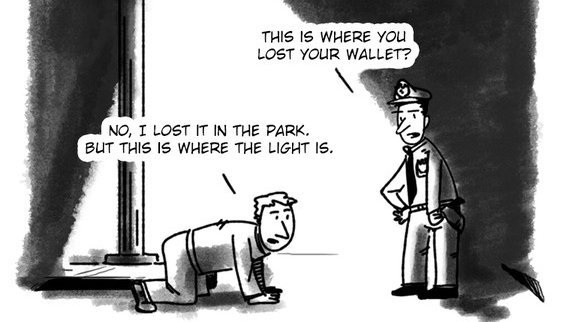 Photo courtesy of The Ethical Skeptic
Photo courtesy of The Ethical Skeptic
Research is more important than ever because, without it, you're just looking where the light is. Research is what allows you to go into the dark unknowns. But that's still only half the story.
Data has become such a buzzword, which is both a good and bad thing. Most institutions don't need more data, they need better data. That's where the power of data actually happens. Asking the right questions, doing really great analysis, giving expert recommendations. Collecting data is easy; it's what you do with it and how you make it actionable that's the hard part.
Oh, and there's one more thing. I'd tell institutions to stop thinking about brand research as some major investment they do only every five years. But to take a more iterative approach and make smaller investments more frequently and test specific metrics that really inform strategic goals and use those data points to track performance over time.
MK: Okay, a couple fun questions. When you're not at work, what are you doing?
Well, because of quarantine we've been watching a lot of TV. We sort of have this cycle of shows that my boyfriend & I watch — at any given time, it's Veep, The Office, Parks & Rec, The Good Place. Something like that. If he's not here, I'll watch some sort of murder documentary or listen to podcasts. I've been doing that a lot lately just because I'm so bored of TV.
MK: Pick three famous people to have over for dinner. Who would you choose?
Mere: Okay, don't laugh. The first one would be Mel Brooks. My dad forced me to watch every Mel Brooks movie growing up, and I think he's hilarious. So I'd invite him. I think I'd invite Michelle Obama, for probably a lot of obvious reasons. I think I'd also add Kristen Bell. I think she's adorable and I want to be friends with her. I also really love the show Veronica Mars, which she stars in.
MK: That is an eclectic dinner party.
Mere: Yeah, it's a pretty entertaining combination. It'd also be fun to have dinner with each of them individually. But it'd still make a fun dinner party.
MK: One last thing. I have to admit, for about the first month I worked at SimpsonScarborough, I thought you were the 'Simpson' in SimpsonScarborough. It didn't help that the first time I met you, you waltzed into the office at like 10:30, wearing flip flops and carrying your dog under your arm. Actually, that's when it sort of codified in my head that you were definitely the Simpson in SimpsonScarborough. It wasn't until our retreat in Big Sky a month later that I realized you were just the lowly AVP of Research. And now you're VP. Congrats again.
Mere: Oh my god, that's funny. That sounds like me. Gosh, I miss being in the office.
MK: Mere, sincere congratulations on behalf of the entire team. We're all so happy for you.
Mere: Thank you!


